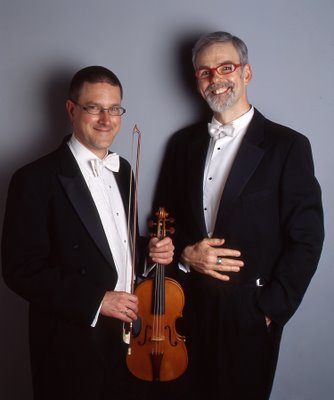Dieterich Buxtehude & The Boys
Friday, May 08, 2009
The Boys being composers (all living in 17th century Germany, Holland and Denmark) Heinrich Ignaz Franz von Biber, Christoph Bernhard, Johann Heinrich Schmelzer, Jan Pieterszoon Sweelinck, Franz Tunder, Johann Caspar Kerll, John Jacob Froberger.
I am not ashamed to admit that I have only heard of three of the above men. And I have even listened to some of their music, in particular the pleasantly depressing Lamento sopra la morte Fedinandi III by Schmelzer (c.1620-80), courtesy of past concerts of the Pacific Baroque Orchestra and Early Music Vancouver. I am not ashamed as the Pacific Baroque Orchestra seems to have taken the mandate to boldly go. And this is refreshing. No more chestnuts, most of their concerts are surprises into uncharted territory.

Earlier this evening I atended a concert of the Pacific Baroque Orchestra at St James Anglican on Cordova. I could rant and rave of the surprising Canadian soprano Linda Tsatsanis whose volume filled the church before I could decide that her voice was beautiful and her diction in German flawless. I could rant and rave about our Vancuouver treasure, organist and harpsichordist Michael Jarvis who tackled Jan Pieterzoon Sweelinck’s Fantasia chromatica on the St James 1938 Casavant Frères de St-Hyacinthe pipe organ that was refurbished in 2003. I could rant and rave of enjoying the distinct pleasure of hearing Natalie Mackie play her six- string Violone and know that even though it looks like a double bass it is possibly a member of the guitar family and is sometimes played over handed and sometimes underhanded. I could rant and rave on listening to the violists Jenny Essers and Stephen Creswell and enjoying Ray Nurse’s Theorbo while praying he didn’t hit the long neck with the church’s ceiling.
I won’t rant and rave about the above. I don’t need to. You can see and hear for yourself the same concert tomorrow Saturday at St. Augustine’s in Kitsilano at 8pm or on Sunday at West Vancouver United Church at 2:30. For more info look here. Not mentioned there is the exciting fact that Organist Michael Jarvis says the organ (which he is going to play) at the West Vancouver United Church is one of the most exciting organs in town.
But I will rant and rave of the performance of guest leader and violinist (a Master’s degree in Harvard, no less!) Scott Metcalfe, violinist Paul Luchkow, and of Michael Jarvis (top photograph that's Luchkow and Jarvis) on his lovely scrolled harpsichord, of the Sonata in F for two violins and continuo by Johann Caspar Kerll (1627-93). It is obvious the Metcalfe was taught well on matters of historical performance practice at Harvard as I noticed this succint sentence in the program notes where he describes Bohemian violinist and composer von Biber:
His music imparts something perhaps distinctly Germanic, an earthy delight undergirded by intellectual rigor, conveyed not merely by pyrotechnical figerwork but by captivating virtuosity of rythm, counterpoint and sonority.
I have not had so many shivers going up my spine since I heard Andrew Manze (violin) and Richar Egarr (harpsichord) play the complete violin sonatas of Giovanni Antonio Pandolfi Mealli some years ago at the Metropolitan Tabernacle near City Hall. And it is no coincidence as both Pandolfi and Kerll composed and worked north of the Alps and both lived within the 17th century. The latter in the Italianate court of imperial Vienna and the former in the Hapsburg court at Innsbruck.
To the ears of this rank amateur I found similarities in style, I could hear those wonderful odd (so many centuries before Thelonius Monk was to continue with the tradition in the past 20th century) notes that sounded fresh in their oddness.
Without going into details that I cannot elaborate since I am not a musician, I can only mention that the music of the 17th century was sometimes described as of the “fantastic style”. These composers (many were Italians some in Naples composing under Spanish influence like Andrea Falconieri.) did away with many of the textual constraints and predetermined harmonies of earlier music and often called upon the performer to improvise on the written music. It is as if for a while, in that century, there were no tried and true formulas and experiment was the ruling force.
Going to these concerts of the Pacific Baroque Orchestra one has the excitement of listening to music that has been rarely performed or recorded before. It is like opening a time capsule from the past and listening to new music paradoxically from that past, yet so fresh and new that it is as avant garde today as it was the first time it was performed. I could easily go from one of these concerts to a Turning Point Ensemble concert of new music and the excitement would continue without any necessary rebooting of my brain.
And from my vantage point sitting in the front row I was having a schizophrenic moment trying to decide if I was a Hapsburg prince or a Holy Roman Emperor. These boys and three women were all performing just for me.






